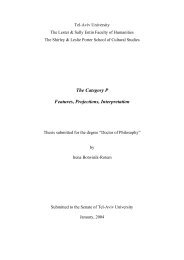How to Avoid a New Financial Crisis
How to Avoid a New Financial Crisis
How to Avoid a New Financial Crisis
Create successful ePaper yourself
Turn your PDF publications into a flip-book with our unique Google optimized e-Paper software.
<strong>How</strong> To Fix It?<br />
One solution is <strong>to</strong> make a bail-out less credible by reducing the cost of alternatives. This<br />
is the logic behind the Administration’s proposal of a “living will”-- a contingency plan that each<br />
institution should prepare <strong>to</strong> show how <strong>to</strong> unwind its obligations without creating excessive costs<br />
<strong>to</strong> the system. In principle, this is a good idea. But would it work in practice?<br />
There is an Italian folktale of a criminal sentenced <strong>to</strong> death by hanging who asked as his<br />
last wish that he be able <strong>to</strong> choose the tree from which he would be hung. Of course, he never<br />
found a tree he liked. Living wills are no different. By definition they cannot be tested except in<br />
a situation of crisis. The problem is that an institution has an incentive <strong>to</strong> design its living will <strong>to</strong><br />
fail, so that the government will have <strong>to</strong> save the firm. In other words we think that financial<br />
institutions will pick a tree where a hanging is impossible.<br />
An alternative approach is <strong>to</strong> accept the fact that rescues cannot be ruled out and <strong>to</strong> limit<br />
risk taking. This is what parents do with small kids. When the risks are sufficiently small that we<br />
can let the kids bear the consequences, we give them the freedom <strong>to</strong> take these risks so that they<br />
can learn. But when the risks are life-threatening and we know that we cannot avoid intervening<br />
<strong>to</strong> rescue the kids, we set an ex ante rule and limit what the kids can do. This is the approach we<br />
suggest here.<br />
One version of this approach is <strong>to</strong> restrict severely the activities in which large financial<br />
institutions engage. We think that this would be very costly and doomed <strong>to</strong> fail. Very costly<br />
because it would require preventing large financial institutions from engaging in most financial<br />
activities-- from writing derivative contracts <strong>to</strong> engaging in proprietary trading. Doomed <strong>to</strong> fail<br />
because such regulations are extremely easy <strong>to</strong> bypass. It takes no time for a clever financier <strong>to</strong><br />
design a contract that gets around most restrictions 7 .<br />
An alternative version of the approach is <strong>to</strong> restrict the <strong>to</strong>tal amount of risk undertaken.<br />
This is what we advocate. Our proposal is very much in spirit of the Basel capital requirements,<br />
but with two big differences. First, one of the problems with Basel II is the faith put in the ability<br />
7 Mervyn King and Paul Volcker have recently suggested that we should reintroduce something like Glass-Steagall,<br />
and require banks <strong>to</strong> be “conservative” in their investments while allowing investment banks more freedom. The<br />
problem with this is that the crisis of 2008 suggests that even investment banks are “<strong>to</strong>o big <strong>to</strong> fail” and so will be<br />
bailed out.<br />
5
















